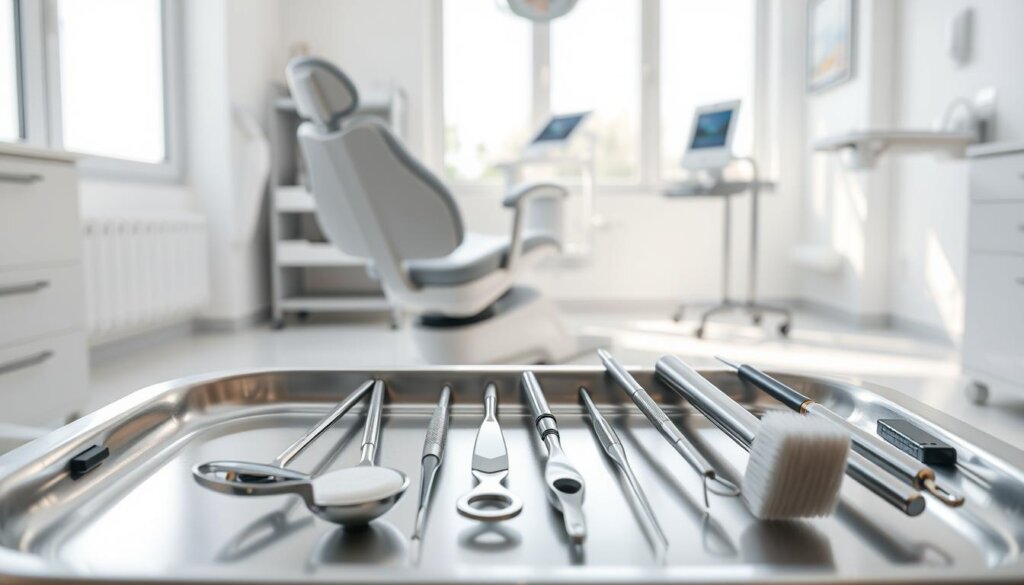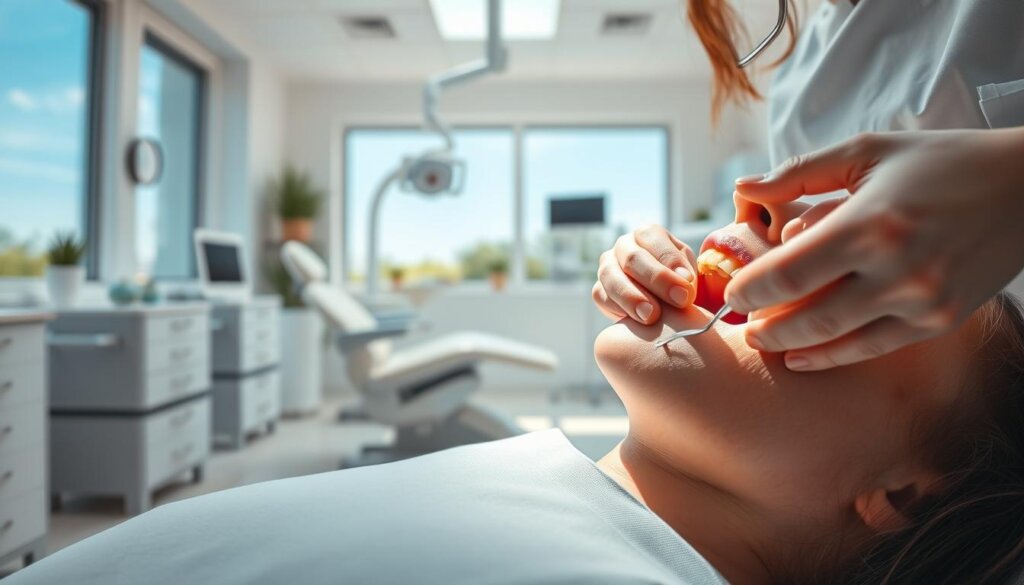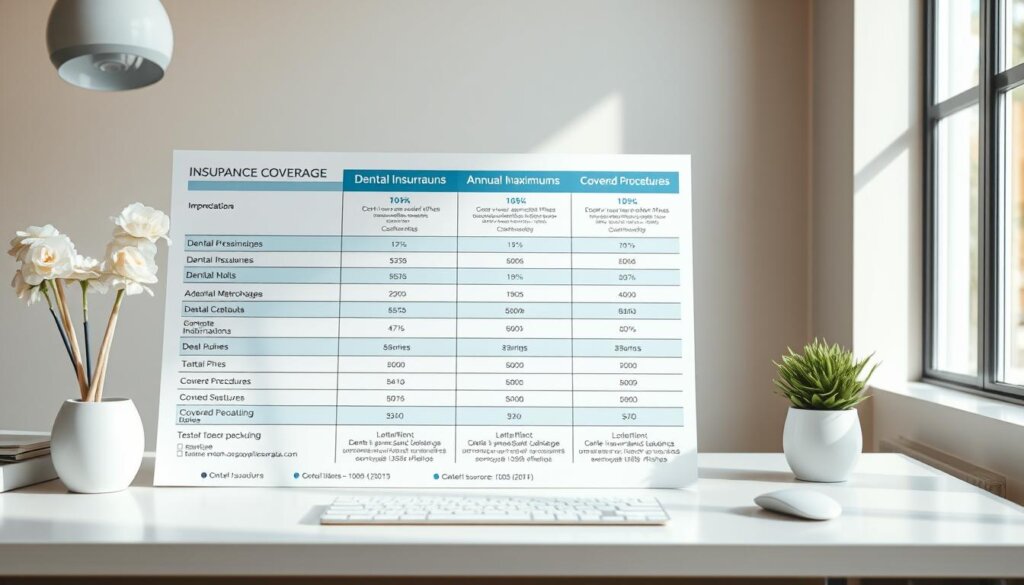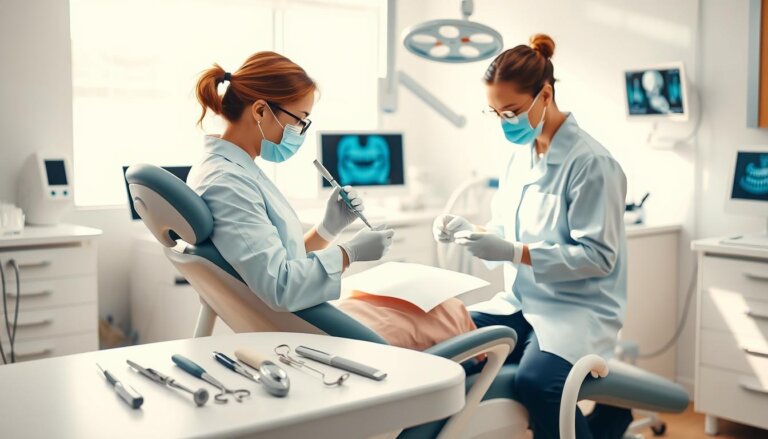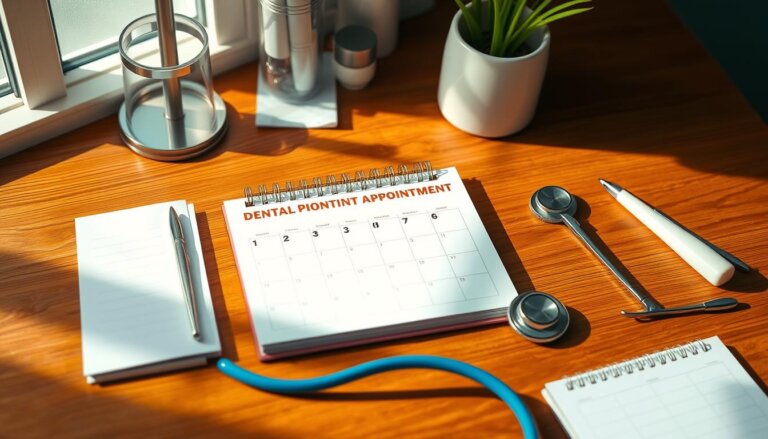How Often Should You Get a Dental Cleaning and Exam?
In our busy lives, 42% of American adults say they don’t see a dentist as much as they’d like. Yet, it’s key to keep up with dental cleanings to avoid problems like tooth decay and gum disease. Dental cleanings and exams are super important for keeping our mouths healthy.
The American Dental Association tells us to get regular check-ups. But, going to the dentist every six months might not fit everyone. Things like diabetes, past dental issues, or how you live can change how often you need a cleaning. So, personalized dental visit plans are becoming more common, because good dental health is part of being overall healthy.
Wondering how often you should check in with your dentist? Finding the right schedule for dental visits is crucial for keeping your mouth healthy. Let’s get ready to learn more about how often we should clean our teeth. We do this not only for a great smile but for our overall health too.
Key Takeaways
- Recognizing the importance of dental cleaning frequency based on individual health needs.
- Rethinking the conventional biannual dental check-up schedule in favor of personalized dental care plans.
- Understanding the broader implications of routine teeth cleaning on systemic health.
- Appreciating the vital role of teeth cleaning appointments in preventing oral diseases.
- Consulting with dental professionals to determine the best time for dental cleanings tailored to unique risks and lifestyles.
Understanding Dental Cleanings and Exams
For keeping your teeth healthy, having a good oral hygiene routine and regular dental exam frequency are key. This section talks about the benefits of dental cleanings and exams. It also explains what happens in each procedure.
What Is a Dental Cleaning?
Dental cleanings, or prophylaxis, remove plaque and tartar from your teeth. They use special tools like ultrasonic scalers and Prophy-Jet. These tools help clean hard-to-reach spots that brushing and flossing might miss.
What Happens During a Dental Exam?
A dental exam is when your mouth gets a full check-up. The dentist looks for decay, gingivitis, and signs of oral cancer. They might use X-rays to get a better view of your teeth and gums. This helps them make the best plan for your oral care.
Why Are Cleanings and Exams Important?
Getting your teeth cleaned and checked regularly is crucial for stopping dental problems. These steps are a big part of keeping your teeth and gums healthy. They lower the risk of cavities and gum disease. Also, how often you get these cleanings and exams is vital for keeping your mouth healthy.
Recommended Frequency for Cleanings
Finding the right dental cleaning frequency is key for healthy teeth and gums. While a six-month cleaning is common for most adults, some may need to visit the dentist more or less often. This depends on things like age, health issues, and dental risks.
General Guidelines for Most Adults
Twice a year visits work well for most adults to keep dental problems at bay. These visits usually include a routine teeth cleaning. It helps remove plaque and tartar, cutting down the chances of cavities and gum problems.
Considerations for Children and Teens
Kids and teens need their own dental care plan. Pediatric dentists often suggest visits that match each kid’s dental growth. This can mean more regular check-ups to build good teeth cleaning habits and catch any teeth alignment issues early.
Special Cases: High-Risk Individuals
Some people might need to see the dentist more often. This includes those with diabetes or a high risk of gum disease. Healthcare providers may advise cleanings every three months for these individuals. This helps keep oral health issues in check.
Factors Influencing Cleaning Frequency
To keep your mouth healthy, sticking to a dental cleaning and exam schedule is key. But, it’s important to know how often to go. By figuring out what your mouth specifically needs, you can keep your teeth and gums in top shape.
Age and Oral Health deeply affect how often you should see the dentist. Young folks with no teeth troubles might not need to go as much. Older people, or those with false teeth, might have to visit the dentist more.
If you have Presence of Gum Disease, you’ll need to go for check-ups and cleanings more often. This stops the problem from getting worse and keeps your mouth healthy.
Lifestyle Habits That Impact Oral Health, like what you eat, smoking, and how well you take care of your mouth, also play a big role. Eating lots of sweets, for example, may mean you have to visit the dentist more to avoid tooth decay.
- Keeping up with a good oral hygiene routine is crucial for healthy teeth and gums.
- Sometimes, you might need to change your dental cleaning and exam schedule because of health or lifestyle changes.
Understanding all these aspects is important for good dental care. It shows why it’s vital to have dental check-ups that are just right for you, helping you maintain the best oral health.
Signs You Might Need More Frequent Cleanings
Keeping up with a regular dental check-up schedule is key for good oral health. But, some signs might show you need professional cleanings more often. Catching these early can stop worse dental issues.
If plaque keeps building up, don’t ignore it. This can turn into tartar, pulling in bacteria that cause tooth decay and gum disease. Struggling with plaque even with good brushing and flossing? You might need dental visits more often.
Gum sensitivity and bleeding should worry you. Some think it’s okay if gums bleed sometimes when they brush. But, it could mean gingivitis. Regular check-ups can tackle this before it gets worse.
Having bad breath or stained teeth can make social situations hard. These could show bigger oral health problems. More frequent cleanings can help get your oral health and confidence back on track.
| Symptom | Potential Cause | Recommended Action |
|---|---|---|
| Persistent Plaque Buildup | Inadequate brushing/flossing | Increase frequency of dental cleanings |
| Gum Sensitivity and Bleeding | Early signs of gingivitis | Consult dentist for possible treatment options |
| Bad Breath or Tooth Discoloration | Bacteria build-up | Schedule a dental examination |
So, if you have symptoms like plaque build-up, sensitive or bleeding gums, bad breath, or discolored teeth, think about getting dental cleanings more often. Early action and regular dental check-ups are vital in stopping oral diseases from getting worse.
The Importance of Preventive Care
Choosing preventive dental care goes beyond just keeping a great smile. It’s key in avoiding bigger health and money issues later. Making routine teeth cleaning part of your daily oral hygiene routine is a smart move for your health and wallet.
Preventive care like regular cleanings is a good deal financially. Doing these regularly can stop the need for costly treatments later. Early action reduces both medical bills and personal stress.
Cost-Effectiveness of Regular Cleanings
Regular cleanings are a big part of preventive care. They catch problems like tooth decay or gum disease early. Going to the dentist often keeps oral health issues from getting worse and costly. Plus, a good oral hygiene routine can keep your natural teeth longer, avoiding expensive options like implants or dentures.
Reducing the Risk of Serious Dental Issues
Serious issues like periodontitis and tooth decay can be lessened with regular care. Periodontitis can cause tooth loss and other big health issues, hitting your wallet hard. Sticking to regular teeth cleanings helps keep your mouth healthy and reduces the chance of needing complex treatments later.
The Role of Your Dentist
The job of a dentist is super important for keeping our mouths healthy. They create personalized dental care plans and keep an eye on our oral health. This means they set the right dental cleaning frequency based on what each person needs.
Everyone’s oral health is different, and dentists get that. They look at dental conditions, how we live, and our genes. This helps them make a care plan that’s just for you. It tackles current problems and stops new ones from happening.
Keeping track of how our oral health changes is key. It helps spot little changes that could lead to bigger issues. By doing regular check-ups, dentists update your personalized dental care plan when needed. This is how they make sure our teeth stay healthy.
- Customized Care Planning: Evaluating patient-specific factors to determine optimal dental care approaches.
- Regular Monitoring: Tracking changes in oral health to adjust care plans promptly.
- Risk Management: Identifying and managing potential dental issues before they escalate.
To sum it up, dentists play a huge role in making sure our dental care is just right. Their expert care keeps our mouths healthy. This is a big part of keeping our whole body healthy too.
What to Expect During Your Visit
Feeling anxious about visiting the dentist is common. Knowing what will happen can reduce your worries. Your visit usually starts with reviewing your dental history and examining your teeth and gums. A cleaning process follows, leaving your mouth feeling fresh.
The cleaning at the dentist’s office is detailed. It aims to remove plaque and tartar, check for gum disease or cavities, and polish your teeth. This important step helps keep your teeth healthy, following the suggested schedule for dental exams.
The Cleaning Process Explained
During cleaning, special tools are used to clean below the gum line. Plaque and tartar are removed carefully. Your teeth are then polished with a high-powered brush and special toothpaste. This leaves your teeth smooth and helps prevent more plaque from forming.
How Long Does an Exam Typically Take?
A regular dental check-up is usually quick, taking less than an hour. Your dentist checks your teeth, gums, and mouth carefully for any problems. The aim is to keep your mouth healthy and stop future issues by sticking to regular exam schedules.
Post-Cleaning Care Tips
After getting your teeth cleaned, you’ll get tips for home care. These include brushing twice a day, flossing daily, and using an antibacterial mouthwash. These habits help keep your teeth healthy between professional cleanings.
Regular dental visits are key to good oral health. They keep your teeth and gums in shape, helping to prevent other health problems. Keeping up with your cleaning appointments and exams is crucial for lasting dental and overall health.
Benefits of Regular Dental Visits
Knowing how regular dental visits help us is key for good oral and general health. Going to the dentist often can make your life better and save money on health costs.
Impact on Overall Health
Studies show that keeping your mouth healthy affects your whole body. Regular dental check-ups can spot early signs of oral cancer, gum disease, and some heart problems. By looking after your teeth, you’re caring for your whole health.
Enhancing Smile Aesthetics
Dentist visits keep your smile looking good. A nice smile boosts how you see yourself and helps in social and work situations. Keeping your teeth in top shape shows you care about your health.
Boosting Confidence and Comfort
Regular dental visits make you confident and comfortable. A mouth free of pain means you can talk to people without worrying about bad breath or how your smile looks. Feeling good about your smile can improve your mental health and life quality.
Understanding Insurance Coverage
Dental insurance is key to keeping your teeth healthy without spending too much. It often covers things like cleanings and exams. That’s because keeping your teeth clean can stop big problems later, which cost more to fix.
To really save money, know how your dental insurance works. Here are some tips on how to do that for cleanings and exams:
- Review Your Plan Annually: Insurance plans change. Checking your plan every year lets you know what’s covered.
- Pre-Approval and Documentation: Some plans want a heads-up before certain treatments. Always send in the paperwork they need to keep costs down.
- Utilize In-Network Dentists: Staying within your insurance’s network can make cleanings and exams cheaper.
- Understand Your Deductibles: Know your deductible. Some services, like cleanings, might not count toward it.
By getting to know your insurance, you can save money and keep your smile bright. Always talk with your dentist about what’s best for your teeth and what your insurance will help pay for.
| Insurance Feature | Benefits |
|---|---|
| Annual Maximums | The most your insurance pays in a year. It’s good to know for big dental work. |
| Frequency of Coverage | Most plans cover two exams and cleanings a year, just like dentists suggest. |
| Preventive Care | Things like cleanings are fully covered, without affecting your deductible. |
If you don’t have enough coverage or no insurance, look into dental discount plans or chat with your dentist about payment options. These can help make care more affordable.
How to Prepare for Your Dental Appointment
Getting ready for your teeth cleaning is key. It eases anxiety and makes your visit efficient. Knowing what to do helps you handle how often you need a dental cleaning. Keep these points in mind before you go.
- Photo Identification and Dental Insurance Card
- A list of current medications and dosages
- Previous dental records and x-rays, if available
Questions to Ask Your Dentist
- How can I improve my oral hygiene?
- Are there any dental issues that I should be aware of?
- How often should I schedule my teeth cleaning appointments?
Preparing for X-Rays and Other Tests
Knowing what to expect makes visits less stressful. Here are tips to smooth the process:
- Avoid wearing jewelry or accessories that might interfere with an x-ray.
- If you are pregnant or might be, inform your dentist as it may affect the use of certain types of x-rays.
- Be prepared to discuss any recent changes in your health, as they can affect your dental health and treatment options.
When to Seek Dental Care Immediately
Knowing when it’s time for immediate dental care is key to good oral health. If not treated fast, some symptoms and conditions could lead to big problems. It’s important to know what a dental emergency is and why you shouldn’t wait to get help to keep your dental check-up schedule working well.
Recognizing Urgent Dental Issues
There are certain signs that mean you need dental care right away. These include bad tooth pain, teeth that are knocked out, and infections. Let’s look at some signs that you need to get help quickly:
- Severe pain that keeps going even after taking medicine from the store.
- Bleeding a lot that doesn’t stop after a little while.
- Swelling in your jaw or mouth that comes on suddenly, which might mean an infection.
- A tooth that comes out because of an accident, which needs to be put back fast to save it.
Understanding the Consequences of Delay
Putting off going to the dentist can cause big problems and lead to more expensive care later. Small issues can become big ones without quick treatment. Here’s what could happen if you don’t deal with dental problems right away:
- Infections could spread, possibly causing dangerous health issues.
- There’s a bigger chance of losing teeth permanently, which affects how your smile looks and your dental health.
- You might end up paying more for treatments or surgery because of waiting too long.
Quick dental care is meant to fix urgent problems and stop bigger issues from happening. Teaching patients about what signs to look for and encouraging them to stick to their dental check-up schedule helps with their dental and overall health in the long run.
Common Misconceptions About Dental Visits
Many people avoid the dentist because of wrong beliefs about dental cleaning and exam schedules. It’s important to correct these misconceptions with true information and smart tips. These should come from preventive dental care practices.
Some think visiting the dentist twice a year applies to everyone. But, dental visits should match a person’s unique health needs. Your age, how you take care of your teeth, and specific problems like gum disease can change how often you need to go.
Another myth is that perfect tooth care at home means you don’t need a dentist. Even if you brush and floss well, you still need a dentist’s help. They have special tools that can clean areas your toothbrush can’t. Professional cleanings help keep your teeth healthy.
Clearing up these myths shows how important it is to see your dentist regularly. Tailored check-ups help keep your mouth, and your body, healthy. This makes sure you get the right dental cleaning and exam schedule.
Finding the Right Dentist
Finding the best dentist is key to great oral health. The right one provides best time for dental cleanings and personalized dental care. Knowing the value of a good patient-doctor bond and when you might need a specialist helps you choose wisely.
Importance of Patient-Doctor Relationships
A good bond with your dentist means care that fits your needs. You’ll feel okay sharing concerns and making choices about your care. Trusting them makes following advice and getting the most out of visits easier, ensuring the best time for dental cleanings works for you.
Considering Specialty Practices
If you have certain oral health needs, think about a specialty dentist. They provide expert care for specific issues like braces or gum care. These experts use the newest methods and tech, improving the personalized dental care you get.
Choosing well means finding a dentist who understands you. A dentist who you can trust and who has special skills is key for your dental health and happiness.
Summary: Your Dental Health Matters
Exploring dental hygiene shows how vital routine oral care is. It’s more than just brushing; it includes visits to the dentist tailored to your needs. These depend on age, gum disease risk, and lifestyle. Good dental habits bring long-term rewards.
Regular Visits Equal Long-Term Benefits
Regular dental check-ups prevent bigger problems later. They catch issues early, helping you stay healthy. Oral health affects your whole body. So, check-ups are a smart way to care for all of you. Preventative care saves you from big health issues and dental costs down the line.
Taking Charge of Your Oral Health
Taking control of dental health means learning and acting. Work with dentists to make a plan that suits you. This lays a strong foundation. Following this plan and a good home routine protects you from dental problems. Keeping your mouth healthy reflects on your overall wellness, leading to a better life.

